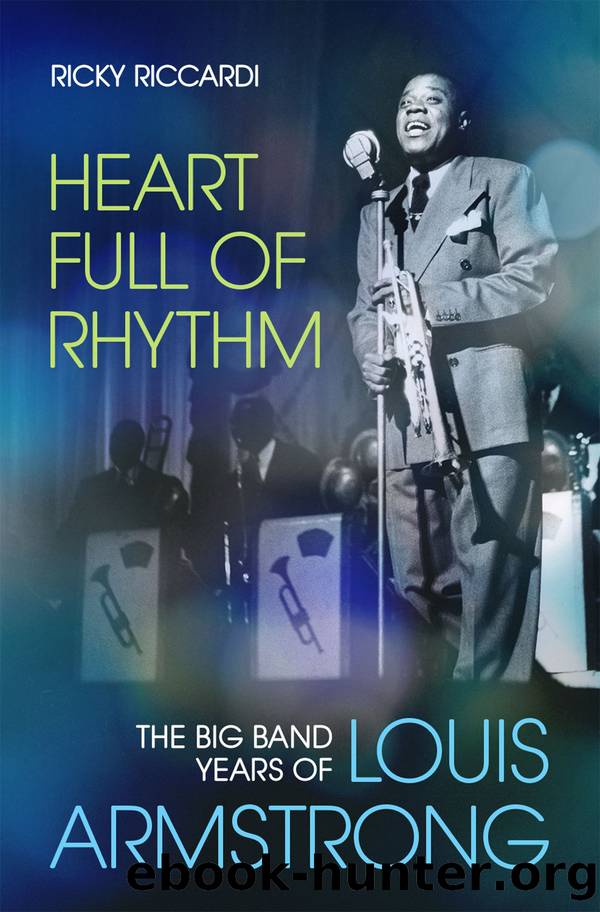Heart Full of Rhythm by Ricky Riccardi

Author:Ricky Riccardi
Language: eng
Format: epub
Publisher: Oxford University Press
Published: 2020-02-15T00:00:00+00:00
16
âA Solid Man for Comedyâ
May 1938âDecember 1939
Joe Glaser moved into his new office in the RKO building at 1270 Sixth Avenue in Manhattan in May 1938, still technically a part of Rockwell-OâKeefe, Inc., but now operating as Joe Glaser Inc. As soon as his contract expired on August 1, he went out on his own, having âhad a peeve on with R-OâK office for some time now.â1 This got a small paragraph notice in Variety, but it garnered a huge headline in the Pittsburgh Courier, acknowledging Glaserâs power in the world of black show business.
Glaser was serving as personal representative to Louis Armstrong, first and foremost, but also bandleaders Andy Kirk, Noble Sissle, Willie Bryant, and Claude Hopkins and two other top trumpeters, Oran âHot Lipsâ Page and Roy Eldridge. Page was an engaging singer and a dynamic trumpeter with a true affinity for the blues, but he would never replace Armstrong in Glaserâs eyes or those of the American public. Reviewing his first Decca single, the Brooklyn Daily Eagle wrote, âA miniature Louis Armstrong comes out of Harlem in the shape of âHot Lipsâ Page, whose trumpet playing and vocalizing show the influence, but not the excellence, of the original âSatchelmouth.âââ2 Armstrong continued to support the fiery Roy Eldridge, sending him a congratulatory telegram after hearing his 1937 recording of âAfter Youâve Gone,â but Eldridge, too, wouldnât overtake Armstrong in Glaserâs plans, much to his frustration. Still, with Red Allen in Armstrongâs trumpet section and Eldridge and Page under his representation, Glaser was now representing three of Armstrongâs greatest black disciple/rivals. His influence could also still be felt on numerous white trumpeters, namely Bunny Berigan and Harry James, the latter performing a snippet of Armstrongâs âShineâ solo at Benny Goodmanâs Carnegie Hall concert in January 1938. âI still think Louie is the father of them all,â James wrote in August 1938.3
However, none of these trumpet men had quite the personality and pure natural comedic ability as Armstrong. Comedy had been an important part of Armstrongâs life since he first heard Bert Williamsâs records when he was still a child in New Orleans. He continued collecting Williamsâs records and learning his routines, which paid off when Decca allowed him to record two of Williamsâs âElder Eatmoreâ sermons in full, each one lasting nearly four and a half minutes. Itâs doubtful the recording sold many copies but itâs still a fine example of Armstrongâs acting and comedic ability, as well as his ultimate public tribute to one of the first great black stars of the 20th century. Armstrongâs most graphic private tribute to Williams came in a 1953 conversation at home with George Avakian, when he said, âLike Bert Williams, if that son-of-a-bitch was here right now, Iâd walk in that room and suck his dick, I guess. Iâm just that thrilled to be with him. . . . But thatâs how much I think of Bert Williams, see what I mean?â4
One week later, Armstrong traveled to Hollywood to appear in
Download
This site does not store any files on its server. We only index and link to content provided by other sites. Please contact the content providers to delete copyright contents if any and email us, we'll remove relevant links or contents immediately.
The Goal (Off-Campus #4) by Elle Kennedy(12433)
Kathy Andrews Collection by Kathy Andrews(10520)
Diary of a Player by Brad Paisley(6866)
What Does This Button Do? by Bruce Dickinson(5527)
Assassin’s Fate by Robin Hobb(5237)
Big Little Lies by Liane Moriarty(4880)
Pale Blue Dot by Carl Sagan(4001)
Sticky Fingers by Joe Hagan(3454)
The Heroin Diaries by Nikki Sixx(2932)
The Death of the Heart by Elizabeth Bowen(2901)
Beneath These Shadows by Meghan March(2718)
The Help by Kathryn Stockett(2704)
Confessions of a Video Vixen by Karrine Steffans(2675)
How Music Works by David Byrne(2526)
Jam by Jam (epub)(2489)
Harry Potter 4 - Harry Potter and The Goblet of Fire by J.K.Rowling(2416)
Strange Fascination: David Bowie: The Definitive Story by David Buckley(2367)
Petty: The Biography by Warren Zanes(2237)
Darker Than the Deepest Sea by Trevor Dann(2207)
